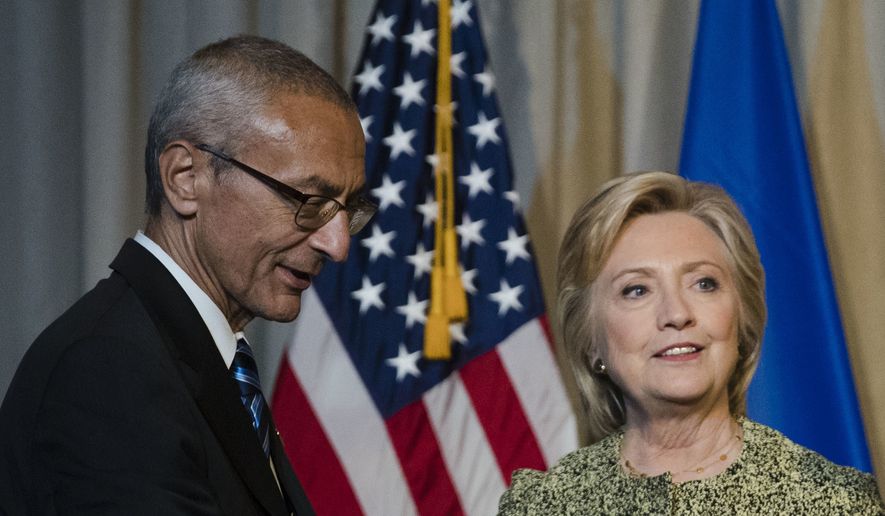A top Justice Department official leaked information to the Clinton campaign about the legal case concerning Hillary Clinton’s secret email server, according to a new email released Wednesday by WikiLeaks that could further taint the administration’s claims of impartiality.
Assistant Attorney General Peter Kadzik sent a heads-up to Clinton campaign Chairman John Podesta in May 2015 letting him know the government was going to try to delay posting Mrs. Clinton’s secret emails until 2016.
In the message, sent from his private account rather than his government-issued account, he also warned of a looming House hearing where he expected a Justice Department official would face questions about Mrs. Clinton’s emails.
Mr. Kadzik becomes the latest administration official to face questions of conflicts of interest when it comes to Mrs. Clinton — complicating President Obama’s election-season pitch to voters.
Yet another WikiLeaks email released Wednesday showed the State Department was sharing information with the Clinton campaign before the first story broke about her secret email account. That email even appears to show the Clinton team advised the State Department on how to word its public statement to The New York Times, which was about to expose the email account and private server.
The series of connections and backdoor communications are not surprising given the Clintons’ long reach in Washington. But they are feeding questions about whether the Obama administration can be an honest broker in pursuing investigations against her.
Sen. Chuck Grassley, Iowa Republican and chairman of the Senate Judiciary Committee, asked the Justice Department’s inspector general on Wednesday to look at whether Attorney General Loretta E. Lynch and her underlings have crossed the line.
“The public’s lack of confidence in the Justice Department’s ability to handle investigations related to former Secretary of State Hillary Clinton’s impartially ought to be of grave concern for its leadership,” Mr. Grassley wrote to Michael E. Horowitz, the inspector general. “The entire matter is in desperate need of independent, objective, non-partisan oversight. As the inspector general, that is your statutory duty.”
He asked for Ms. Lynch, Mr. Kadzik and FBI Deputy Director Andrew McCabe all to face scrutiny over the appearance of conflicts of interest.
The Justice Department didn’t respond to a request for comment Wednesday night.
For its part, the State Department was indignant when reporters asked about the email showing collusion last year.
“I’m not gonna talk about leaked documents,” spokesman John Kirby told reporters — though he then said there are times when the department needs to reach former officials to ensure department statements are accurate.
Mr. Kirby also denied that the department is coordinating with the Clinton campaign.
Ms. Lynch has been in a tenuous position since this summer, when she met with former President Bill Clinton at a Phoenix airport just as the FBI was wrapping up its investigation into Mrs. Clinton’s mishandling of classified material.
Just days later Ms. Lynch officially cleared Mrs. Clinton of criminal wrongdoing, saying she accepted FBI Director James B. Comey’s finding that the former senator, first lady and chief diplomat was too inept to know the risks she was running with top secret information, so he couldn’t prove she did it intentionally.
Now all sides are firing at each other after Mr. Comey last week said he had renewed the investigation after agents found potentially “pertinent” email messages on a computer used by top Clinton aide Huma Abedin.
The White House initially said it wouldn’t question Mr. Comey, but President Obama reversed himself Wednesday and did just that.
“We don’t operate on incomplete information,” the president said in an interview broadcast by NowThis News, suggesting — without ever using his name — that Mr. Comey was being unfair to Mrs. Clinton. “We don’t operate on leaks. We operate based on concrete decisions that are made.”
Mr. Obama and his team have gone out of their way to defend Mrs. Clinton, his chosen successor, throughout the email investigation. The president said he didn’t think she broke any laws, even while Mr. Comey’s agents were still probing that question.
And the Justice Department repeatedly took positions in court that would have assisted Mrs. Clinton, including attempting to delay the public release of her emails and arguing against asking her to turn over her secret server.
In the end, a judge ordered a faster release, and the FBI got a hold of the server and other devices, recovering thousands of work-related messages that Mrs. Clinton never turned over — despite her initial public assurances otherwise.
In addition to Mr. Obama, the Justice Department is reportedly at odds with Mr. Comey over his handling of the renewed investigation.
Ms. Lynch, as attorney general, has the final say on those matters, and Mr. Kadzik, as the department’s liaison with Congress, is also playing a role in the department’s handling of the investigation.
That makes the newly revealed email about his backdoor communication with Mr. Podesta, which Mr. Kadzik sent from his private account, not his government account, all the more suspicious in the eyes of critics.
Mr. Kadzik’s history with Mr. Podesta goes back years, to when he was a lawyer representing Mr. Podesta during investigations into the Clinton administration. Mr. Kadzik also lobbied the Clinton administration — and Mr. Podesta in particular — over presidential pardons.
The two men continued to meet even during the Justice Department’s investigation into Mrs. Clinton, and last year Mr. Kadzik’s son, P.J., asked Mr. Podesta to help him get a job on the Clinton campaign.
“Given these facts, Mr. Kadzik’s relationship with the Clintons and their associates is incompatible with the ability of Congress to have any confidence in his ability to be fair and impartial in advising on decisions about how to respond to Congressional oversight inquiries related to these matters,” Mr. Grassley said in his request for a probe Wednesday.
• Stephen Dinan can be reached at sdinan@washingtontimes.com.




Please read our comment policy before commenting.